Overview
Childhood trauma can leave deep marks that may surface in adulthood as various symptoms. You might find yourself experiencing intense emotional reactions, chronic pain, or difficulties in relationships, alongside cognitive challenges. Recognizing these symptoms is the first step toward healing. Have you ever felt overwhelmed by your past? Understanding these feelings is crucial, and seeking tailored therapeutic interventions can be a transformative journey.
Mindfulness practices and evidence-based therapies, such as Cognitive Behavioral Therapy (CBT) and Eye Movement Desensitization and Reprocessing (EMDR), offer pathways to healing and personal growth. These approaches are designed to help you navigate your emotions and experiences gently. As we explore this further, remember that you are not alone in this journey. Many have walked a similar path and found solace in professional support.
Taking the step to seek help can be daunting, but it is also a courageous act of self-care. Embrace the possibility of healing and personal growth—your journey is important, and there is support available to guide you along the way.
Introduction
In the heart of Denver, a transformative journey awaits those grappling with the shadows of childhood trauma at The Emerald Couch, a dedicated psychotherapy practice. Have you ever felt overwhelmed by your past? This practice embraces a holistic approach to mental health, recognizing that healing requires more than just addressing symptoms; it demands a personalized touch that honors each individual's unique experiences.
As the prevalence of trauma-related issues becomes increasingly acknowledged, The Emerald Couch stands out by offering tailored therapy sessions that integrate evidence-based methods such as:
- Cognitive Processing Therapy
- EMDR
By fostering a compassionate environment, they empower clients to navigate the complexities of trauma, reclaim their lives, and cultivate resilience.
In addition to this, this article delves into the multifaceted impact of childhood trauma on mental health and highlights effective strategies for recovery, emphasizing the importance of seeking professional help in this vital journey toward healing.
The Emerald Couch: Tailored Therapy for Childhood Trauma Recovery
The Emerald Couch, in Denver, Colorado, focuses on stress and anxiety disorders among adults, employing a holistic approach to mental well-being. This practice is committed to helping clients recalibrate, recover, and heal from their past experiences through personalized sessions that include both in-person counseling and telehealth options. By recognizing individuals as more than just their pasts, The Emerald Couch emphasizes comprehensive care and personal development, which is essential for those facing the symptoms of childhood trauma in adulthood.
Current statistics reveal that a significant number of adults in Denver seek therapy for the symptoms of childhood trauma in adulthood, reflecting a growing awareness of the importance of mental health support. The practice's emphasis on individualized care is particularly crucial, especially since 62% of individuals receiving medication for PTSD experience improvement, underscoring the effectiveness of targeted therapeutic interventions. The Emerald Couch utilizes various evidence-based methods, including Cognitive Processing Therapy (CPT) and EMDR, to navigate the complexities of PTSD and anxiety disorders.
As we explore this further, it's important to note that case studies validate the practice's approach, showing that PTSD often co-occurs with other mental health disorders, such as depression and anxiety, as well as various addictions, including alcohol and opioids. Recognizing and treating these co-occurring conditions is vital for effective management and recovery from PTSD. This holistic perspective is evident in the practice's unwavering commitment to client safety and confidentiality throughout the treatment process, ensuring a nurturing environment for healing.
Hope knows the sun has risen even when the clouds cover every ray of light. This sentiment resonates deeply with those who have faced hardship, serving as a reminder that healing is indeed possible. The Emerald Couch stands out by offering a compassionate space where clients can explore their mental health needs, fostering resilience and personal growth. For those beginning their healing journey, reaching out for support is a vital first step. This dedication to high-quality, evidence-based care positions The Emerald Couch as a valuable resource for anyone prioritizing their mental well-being.
Intense Emotional Reactions: Recognizing Overwhelming Feelings
Adults who have experienced childhood adversity often find themselves grappling with intense emotional responses, which are often considered symptoms of childhood trauma in adulthood, such as overwhelming sadness, anger, or anxiety. Have you ever felt overwhelmed by your past? These reactions can frequently appear excessive in relation to the triggering circumstances, often reflecting symptoms of childhood trauma in adulthood and leading to a sense of dysregulation.
Research indicates that affective dysregulation is common among individuals who have faced distressing events, which may be seen as symptoms of childhood trauma in adulthood, highlighting the significant challenges they encounter in managing their emotions effectively. Mindfulness practices, including meditation and mindful breathing, can be powerful allies for trauma survivors. By fostering awareness of thoughts, feelings, and bodily sensations, mindfulness encourages individuals to observe their responses without judgment. This practice can help slow down automatic reactions, providing an opportunity for a more .
For instance, you might notice symptoms of childhood trauma in adulthood, such as reacting with extreme anger to minor frustrations or feeling paralyzed by anxiety in everyday situations. Mindfulness creates the space needed to recognize these patterns and choose healthier coping strategies, which can significantly enhance personal relationships and overall quality of life.
A case study titled 'Building Trust in Trauma-Informed Care' sheds light on the barriers to trust that individuals affected by distress often face in clinical settings, particularly within marginalized groups. The findings emphasize that understanding the historical context of trauma and fostering a safe, supportive environment can enhance trust and improve patient engagement in treatment.
Incorporating mindfulness methods within this framework can further empower individuals to manage their emotions effectively, particularly for those exhibiting symptoms of childhood trauma in adulthood, as experts note that the risk of treatment dropout is notably higher for clients with severe PTSD symptoms, as highlighted by Zayfert and DeViva. This underscores the importance of tailored therapeutic approaches, such as:
- Dialectical Behavioral Therapy (DBT)
- Acceptance and Commitment Therapy (ACT)
- Cognitive Behavioral Therapy (CBT)
- Exposure and Response Prevention (ERP)
By acknowledging these intense feelings and integrating mindfulness techniques, individuals can navigate their psychological landscape more effectively, which is essential for addressing symptoms of childhood trauma in adulthood and seeking appropriate interventions, paving the way for healing and personal growth.
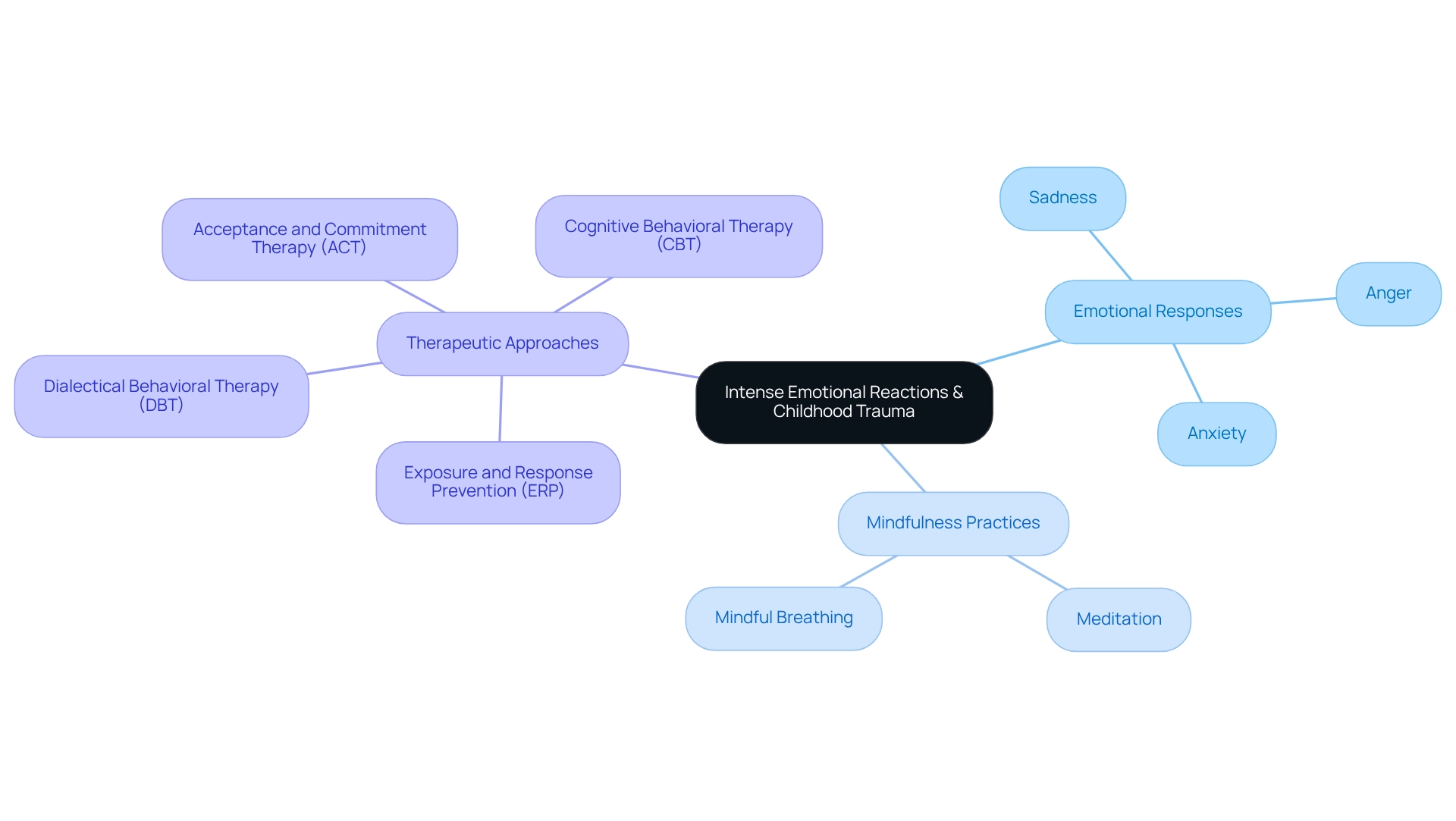
Dissociation: Understanding Disconnection from Reality
Dissociation: Understanding Disconnection from Reality
Dissociation represents a profound disconnection from one’s thoughts, feelings, or sense of identity. Often emerging as a coping mechanism for those who have endured trauma, it can manifest in various ways. Have you ever felt overwhelmed by your past? Adults may find themselves zoning out during conversations, encountering memory lapses, or feeling detached from their environment. The symptoms of childhood trauma in adulthood are not merely fleeting moments; they can significantly impact daily functioning and interpersonal relationships.
At The Emerald Couch, we recognize the transformative power of integrating mindfulness into therapy. This approach enhances self-awareness and emotional regulation, essential for addressing dissociative symptoms. Mindfulness practices, such as meditation and attentive breathing, assist individuals in observing their thoughts and emotions without judgment. This promotes a deeper comprehension of their experiences, which is crucial for trauma survivors. It empowers them to identify their trauma responses and seek appropriate therapeutic support.
Research indicates that unaddressed trauma-related dissociation can hinder treatment adherence and affect pharmacological responses. This underscores the importance of recognizing the symptoms of childhood trauma in adulthood. For instance, individuals diagnosed with dissociative amnesia often exhibit normal physical and neurological assessments, complicating their treatment journey. This highlights the need for awareness and understanding of dissociation in therapeutic settings, particularly through the personalized approach that The Emerald Couch offers.
Case studies, such as the one titled "," reveal that untreated dissociative disorders can lead to increased functional impairment, disability, and higher healthcare costs. Addressing these disorders through specialized training and effective treatment, including mindfulness techniques, can alleviate these burdens and improve personal outcomes.
By fostering awareness of the symptoms of childhood trauma in adulthood and integrating mindfulness into the therapeutic process, individuals can take proactive steps toward healing and reclaiming their sense of self. If you recognize these symptoms in yourself or someone you know, consider reaching out to a mental health professional at The Emerald Couch for guidance and support.
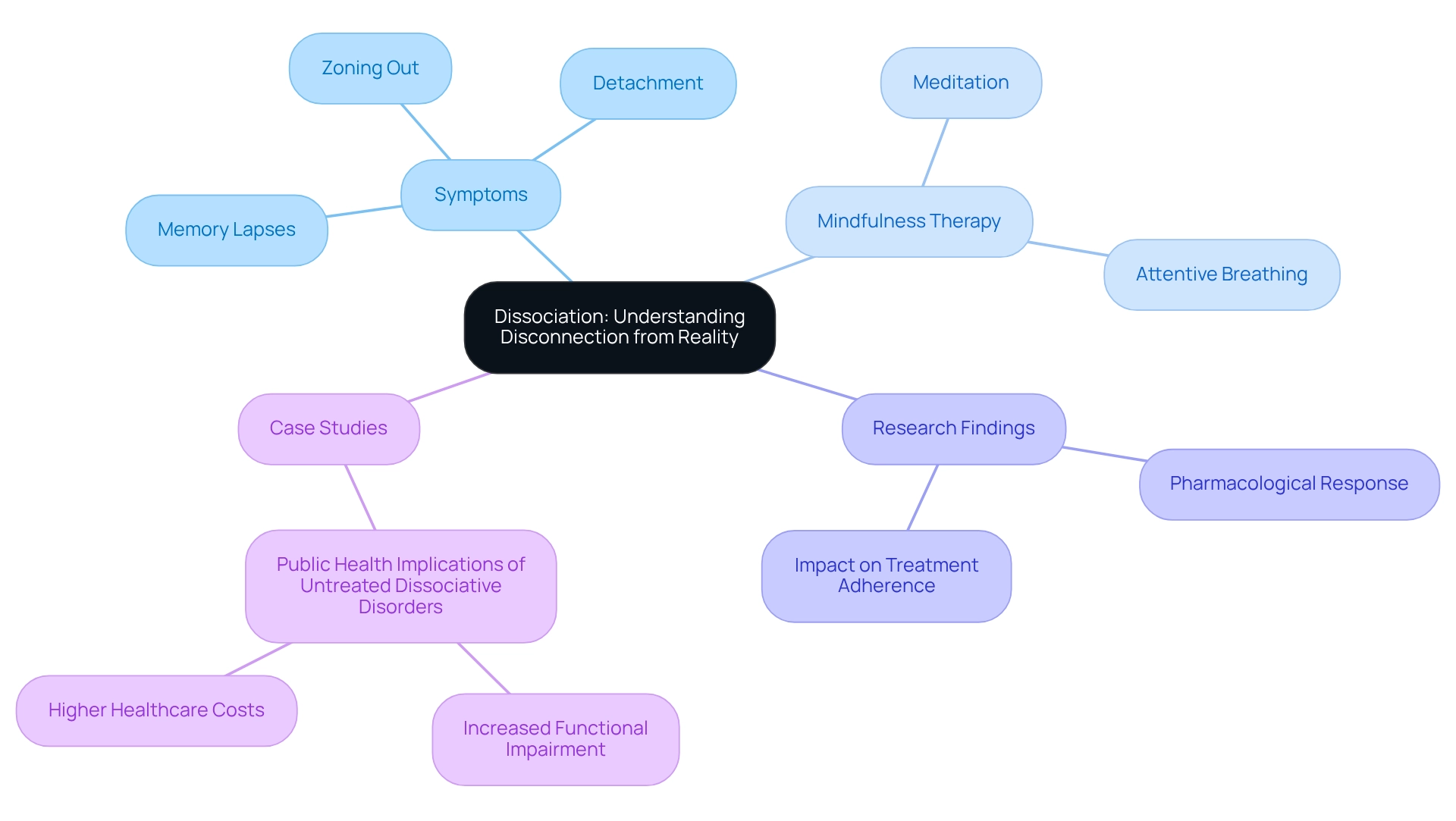
Chronic Pain and Fatigue: The Hidden Physical Toll of Trauma
Adults who have experienced childhood distress often find themselves grappling with chronic pain and fatigue, which are symptoms of childhood trauma in adulthood that defy traditional medical explanations. This unseen burden can take many forms, such as persistent headaches, muscle tension, and gastrointestinal issues. Research reveals a significant connection between childhood maltreatment and the symptoms of childhood trauma in adulthood, as demonstrated through trials assessing sensitivity to both hot and cold pain. This underscores the urgent need for a deeper understanding of how early distress influences the symptoms of childhood trauma in adulthood and affects physical well-being.
Integrating mindfulness practices into therapy can be especially beneficial for trauma survivors. Techniques such as meditation, breath awareness, and body scans help individuals cultivate awareness of their thoughts, emotions, and physical sensations. This heightened awareness empowers patients to recognize and manage their pain more effectively, nurturing resilience and promoting psychological balance.
A pivotal study titled 'Holistic Treatments for Chronic Pain' emphasizes the necessity of addressing both the physical and emotional dimensions of pain for those with traumatic backgrounds. By combining physical therapy, psychological support, and mindfulness practices, this comprehensive approach seeks to empower patients and enhance their overall well-being.
Statistics show that individuals with a history of distress frequently report chronic fatigue, which is one of the symptoms of childhood trauma in adulthood, and this can exacerbate . This fatigue is not merely a symptom; it reflects a complex interplay of psychological and physiological factors that can impede recovery. Specialists advocate for care that acknowledges these connections, highlighting the importance of healthcare professionals being equipped to address the intricate nature of pain in individuals who have faced distress. As Bussières noted, "Our findings support the need to broaden healthcare provider understanding of the associations between adverse childhood experiences and chronic pain, and adequately prepare them to provide trauma-informed care pain management."
The physical repercussions of childhood adversity are profound, with many health professionals recognizing that the symptoms of childhood trauma in adulthood extend well beyond emotional distress. By acknowledging these connections and incorporating mindfulness into therapeutic practices, individuals can navigate their healing journeys more effectively, fostering resilience and improving their quality of life. Have you ever felt overwhelmed by your past? If so, consider reaching out for support to embark on your path to healing.
PTSD Symptoms: Identifying Signs of Past Trauma
(PTSD) can manifest in various forms, including flashbacks, nightmares, and heightened anxiety. Have you ever felt overwhelmed by your past? Adults who have experienced childhood adversity often find themselves reliving distressing events or exhibiting hyper-vigilance in everyday situations, both of which are symptoms of childhood trauma in adulthood. Identifying the symptoms of childhood trauma in adulthood is vital, as they can greatly affect daily functioning and overall well-being. This emphasizes the significance of early intervention and assistance customized to the distinct experiences of individuals who have faced distress. As we explore this further, incorporating mindfulness techniques into therapy, such as those found in dialectical behavioral therapy (DBT) and acceptance and commitment therapy (ACT), can significantly enhance the treatment of PTSD.
Mindfulness practices, including breath awareness and body scans, help individuals develop greater self-awareness and emotional regulation. By learning to observe their thoughts and feelings without judgment, survivors of distress can create a space between themselves and their experiences, reducing the intensity of their symptoms. Expert insights reveal that while PTSD may not always develop immediately after an episode of abuse, there is a significant correlation between childhood adversity and the symptoms of childhood trauma in adulthood. Remarks from mental health experts highlight the importance of identifying these signs promptly to enable efficient care and recovery.
Real-life instances of counseling for PTSD in individuals who have experienced distress illustrate the effectiveness of tailored treatment methods. By fostering a supportive environment and integrating mindfulness practices, therapists can help clients navigate their unique challenges, empowering them to reclaim their lives and prioritize their mental well-being. Recognizing these signs is the first step toward seeking the appropriate therapy and support necessary for healing. If you or someone you know is struggling with these symptoms, reaching out for professional help can be a vital step toward recovery.
Relationship Difficulties: The Long-Term Effects of Childhood Trauma
Adults who have faced childhood adversity often grapple with significant relationship difficulties, which can be seen as symptoms of childhood trauma in adulthood, such as trust issues, fear of intimacy, and avoidance behaviors. These challenges create a cycle of unstable relationships and deep feelings of isolation. Have you ever felt overwhelmed by your past? Research shows that the symptoms of childhood trauma in adulthood can negatively impact , primarily through their influence on attachment styles and perceived social support. For instance, studies indicate that around 70% of individuals who have experienced distress report a pervasive sense of distrust, complicating their ability to form and maintain close connections.
The prevalence of trust issues among trauma survivors highlights the symptoms of childhood trauma in adulthood, as many struggle to engage fully in relationships due to their past experiences. This often leads to patterns of avoidance, where individuals may withdraw from potential partners to protect themselves from perceived threats of emotional pain. Such behaviors not only hinder personal growth but also lead to symptoms of childhood trauma in adulthood, perpetuating feelings of loneliness and disconnection.
As we explore this further, expert opinions emphasize the importance of addressing these relationship challenges in counseling. A compassionate approach, as highlighted in the case study "Empathy and Validation in Trauma Recovery," underscores the necessity of fostering a sense of worthiness and respect in patients. This validation can significantly enhance their recovery journey, enabling them to confront and navigate their fears of intimacy. Mindfulness practices incorporated into therapy can further support this process by helping individuals slow down and observe their thoughts and feelings without judgment, creating space for healthier relationship patterns.
Cognitive Processing Therapy (CPT) is one structured approach that can be beneficial for trauma survivors, focusing on understanding and changing unhelpful thoughts related to their experiences. However, statistics reveal that treatments for adult survivors of childhood adversity are often costly and frequently inaccessible, with some estimates indicating that over 60% of individuals do not receive the necessary support. This lack of access complicates their healing journey, as financial barriers can prevent them from seeking therapy. Yet, improved understanding of recovery journeys can alleviate emotional distress for both patients and healthcare providers, paving the way for more effective therapeutic interventions.
Ultimately, recognizing these patterns of relationship challenges is essential for individuals who have experienced symptoms of childhood trauma in adulthood. As Chris Antonio, a U.S. Army Veteran, shared, "I had distanced myself for quite some time from relationships and family. I had to go through a divorce." This personal insight highlights the profound impact of the symptoms of childhood trauma in adulthood on adult relationships. By acknowledging the symptoms of childhood trauma in adulthood and how they affect adult relationships, individuals can begin to heal and cultivate healthier connections. Seeking help from a qualified therapist, particularly one who incorporates mindfulness and a compassionate approach, can be a vital step in this journey, fostering resilience and personal growth.
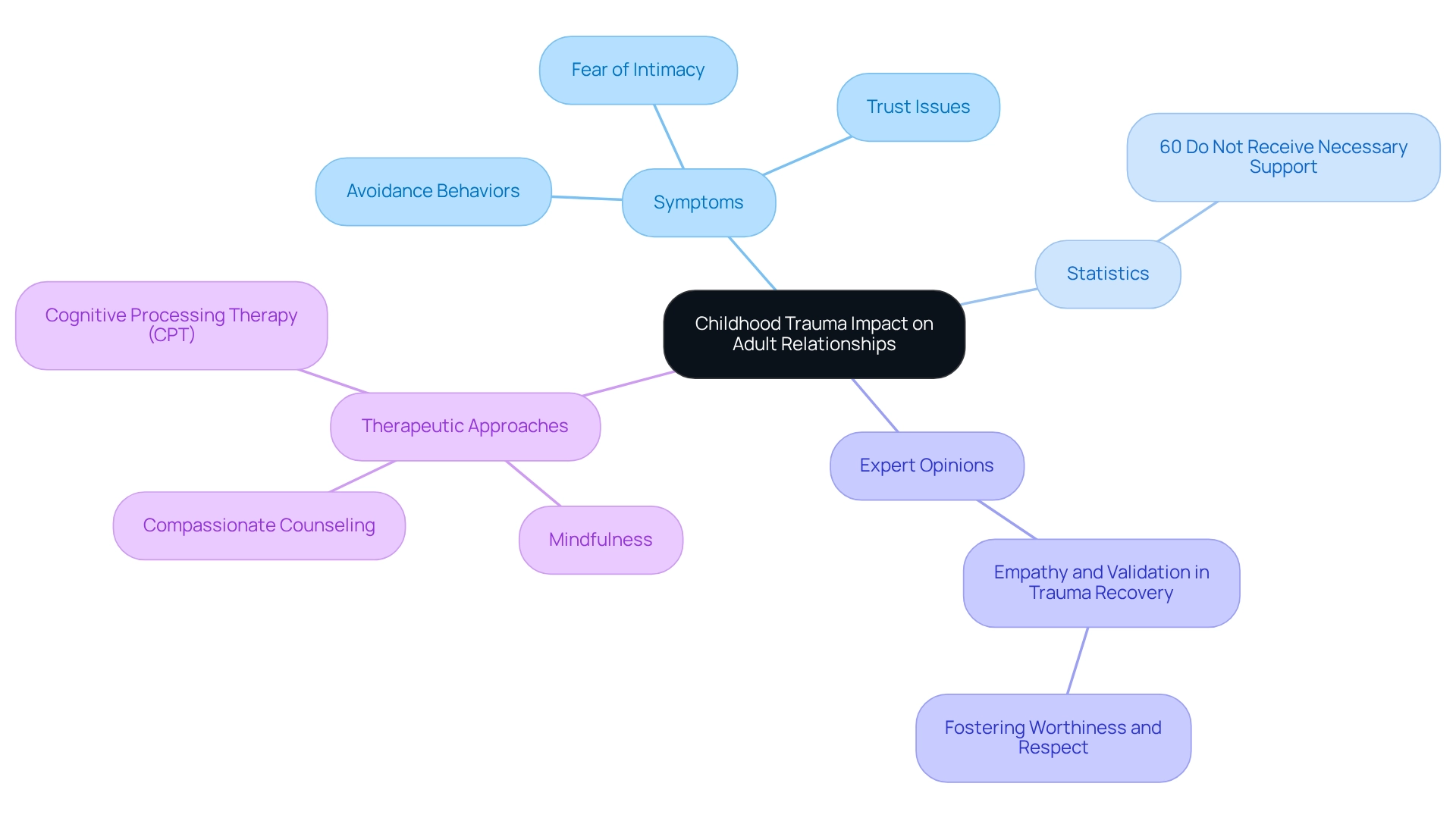
Memory Problems: The Cognitive Impact of Childhood Trauma
Adults who have faced childhood adversity often report significant memory issues, which are considered symptoms of childhood trauma in adulthood, manifesting as challenges in concentration, forgetfulness, and fragmented recollections. These cognitive hurdles can severely impede daily functioning, leading to feelings of frustration and inadequacy. Have you ever felt overwhelmed by your past? Research shows that childhood adversity is linked to , especially in attention and memory tasks. A study involving 76 participants specifically examined the impact of elevated cortisol levels—often a response to trauma—on cognitive abilities, revealing that these heightened levels negatively affected performance in cognitive tasks, further complicating the lives of those affected.
The prevalence of cognitive issues among individuals affected by distressing experiences highlights the symptoms of childhood trauma in adulthood, which is alarming. Many struggle to achieve their educational and professional goals due to these impairments. For instance, a study on academic achievement hypothesizes a direct correlation between childhood adversity and the symptoms of childhood trauma in adulthood, emphasizing the need for supportive interventions. Cognitive psychologists, including Elizabeth W Twamley, Ph.D., assert that the symptoms of childhood trauma in adulthood are associated with poorer cognitive performance in older adults, highlighting the significant influence of trauma on cognitive functioning and daily life.
Incorporating mindfulness practices, such as meditation and mindful breathing, into therapy can be particularly beneficial for addressing these cognitive issues. Mindfulness aids individuals in slowing down and becoming more conscious of their thoughts and emotions, enabling them to identify patterns that may be affecting their mental well-being. By promoting a greater awareness of their inner experiences, those who have experienced distress can learn to manage their cognitive challenges more effectively. Real-life examples illustrate the profound impact of these memory problems. Many share experiences of forgetting important tasks or having difficulty concentrating during discussions, which can result in misunderstandings and strained relationships. For instance, a person who has experienced significant distress might forget an important work deadline, leading to stress and anxiety.
Expert insights suggest that addressing these cognitive issues through targeted therapeutic interventions, including mindfulness, is crucial for recovery. By understanding the cognitive consequences of childhood adversity and the symptoms of childhood trauma in adulthood, individuals can better navigate their challenges by integrating mindfulness into their healing journey. This journey is not only about overcoming obstacles but also about seeking the appropriate support to foster healing and resilience. Remember, you are not alone in this; there is hope and help available.
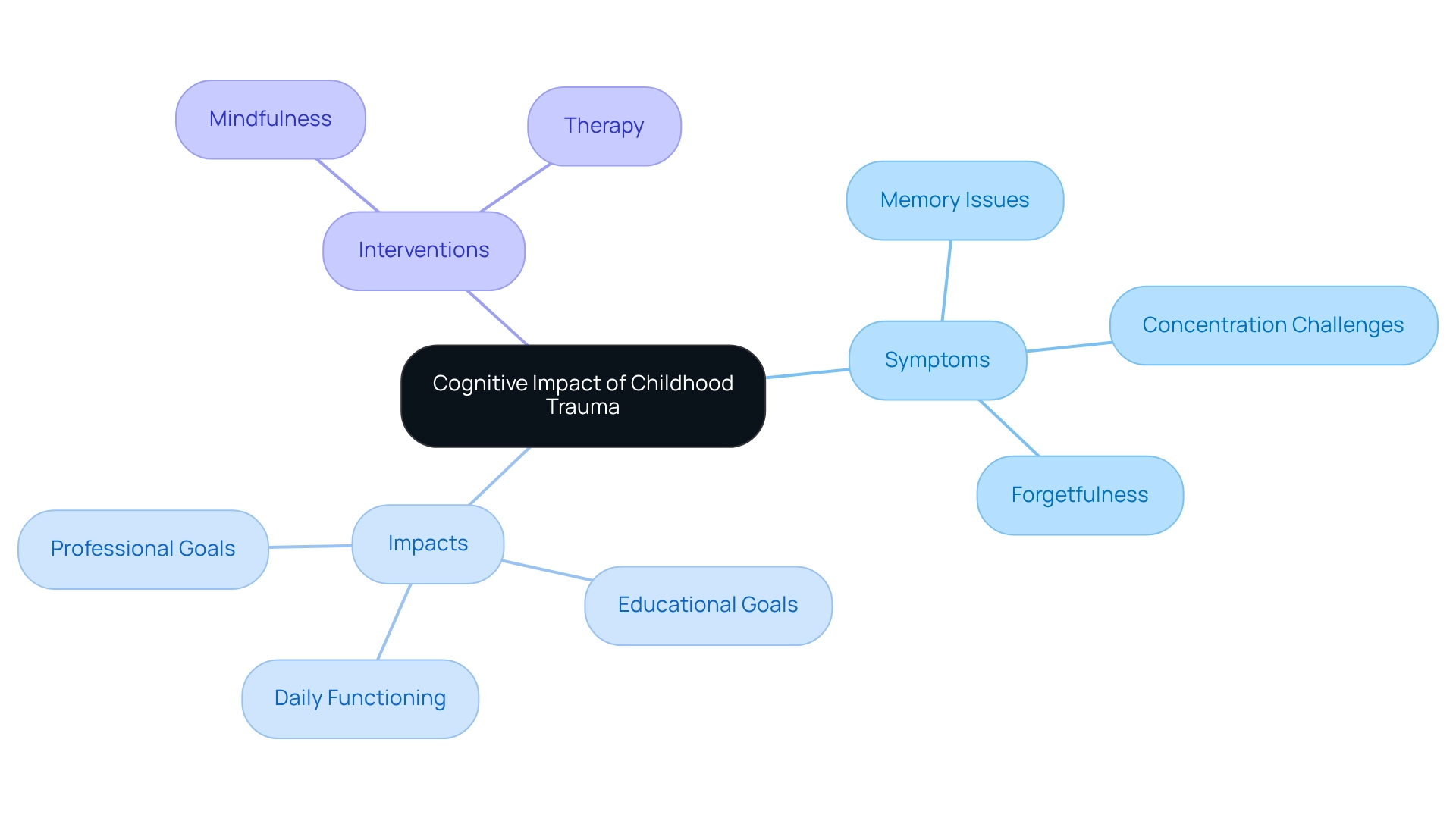
Maladaptive Coping Strategies: Navigating Trauma Responses
Adults who have faced childhood adversity often exhibit symptoms of childhood trauma in adulthood, which can lead them to adopt maladaptive coping strategies such as substance abuse, avoidance, and self-harm. While these behaviors might offer temporary relief from emotional pain, they ultimately obstruct the path to genuine healing. Many individuals seek solace in substances to numb their suffering, revealing of substance misuse among those who display symptoms of childhood trauma in adulthood. This connection underscores the urgent need for awareness and intervention in our communities.
Experts emphasize that addictive behaviors frequently arise from attempts to alleviate psychological distress, particularly through maladaptive strategies like substance abuse and avoidance. Mental health professionals highlight how these behaviors can perpetuate a cycle of avoidance, preventing individuals from confronting their pain and fostering true healing. Gabor Maté, a renowned doctor and addiction specialist, poignantly states that all addictive behaviors serve to either ease pain or distract from it, reinforcing the necessity of addressing the underlying issues.
Integrating mindfulness practices into therapeutic approaches—such as meditation and conscious breathing—can significantly enhance emotional regulation and self-awareness for those who have experienced trauma. Mindfulness techniques empower individuals to observe their thoughts and feelings without judgment, creating a nurturing space for healing and growth. Case studies illustrate that the symptoms of childhood trauma in adulthood, including hypervigilance, chronic shame, and emotional instability, can permeate various areas of life if left unaddressed. Recognizing these symptoms is vital, as it encourages individuals to seek support and adopt healthier coping mechanisms.
By acknowledging the prevalence of these maladaptive strategies and incorporating mindfulness into their recovery journey, those who have endured distress can take meaningful steps toward healing. This journey can lead to a more fulfilling life, free from the burdens of the past. At The Emerald Couch, we offer tailored support to help individuals navigate these challenges and build resilience. Have you ever felt overwhelmed by your past? We are here to guide you on the path to healing.
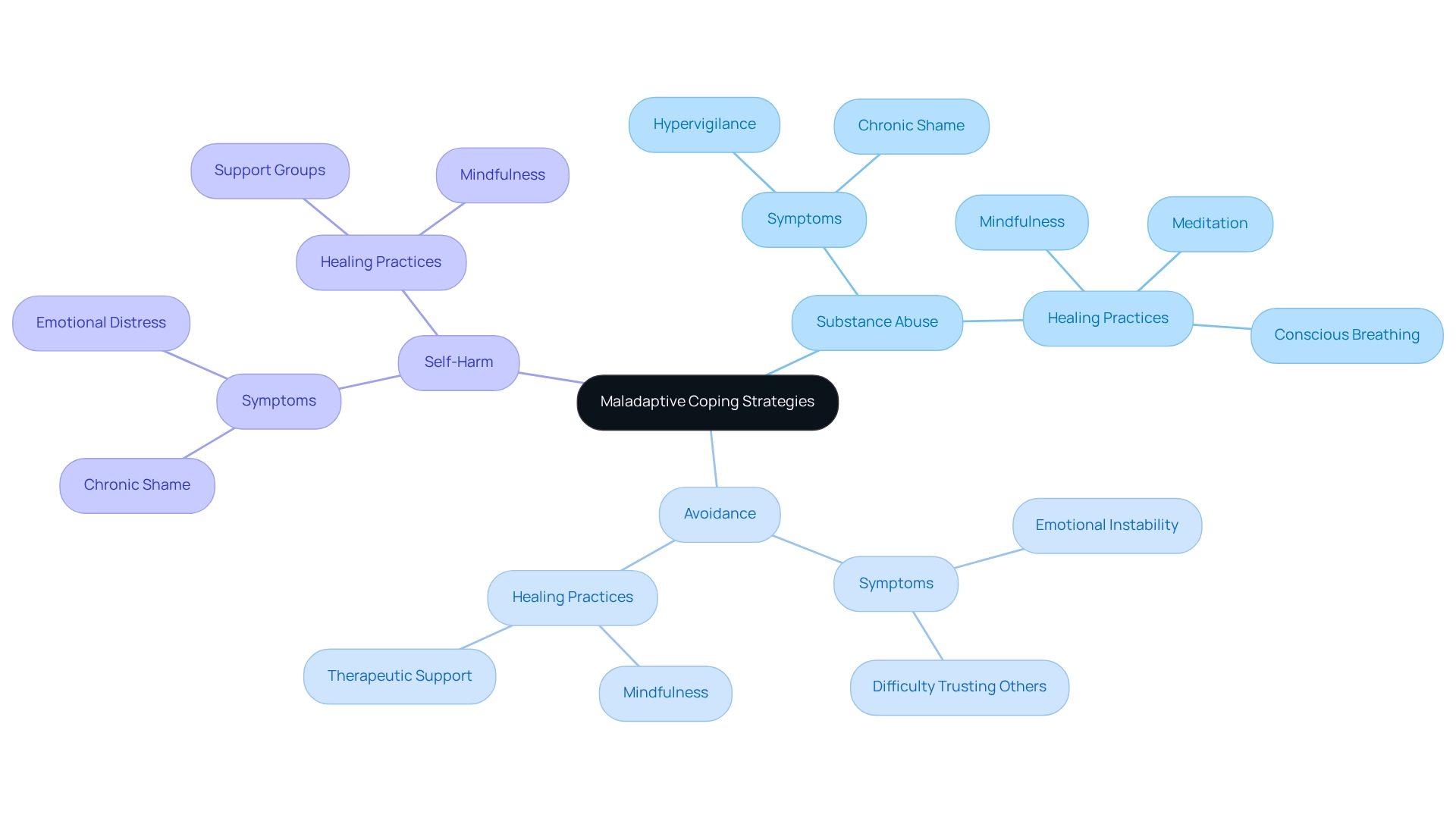
Building Resilience: Strategies for Healing from Childhood Trauma
Developing resilience is essential for anyone on the journey to healing from the symptoms of childhood trauma in adulthood. Have you ever felt overwhelmed by your past? Practicing mindfulness can be a powerful strategy, as it has been shown to significantly reduce symptoms of anxiety and depression. Engaging in supportive relationships fosters a sense of belonging and safety, which is crucial for healing. Mindfulness practices, such as meditation and deep-breathing exercises, serve as effective tools for enhancing mood regulation and promoting recovery. Establishing achievable objectives can also empower individuals, offering a clear path for personal development.
Practical examples demonstrate the success of these methods. For instance, studies have shown that resilience-focused interventions can lead to substantial improvements in , particularly in children and adolescents. A systematic review highlights that these interventions effectively reduce depression and anxiety symptoms, underscoring the importance of cultivating resilience not just in youth but also in adults who experience symptoms of childhood trauma in adulthood. By prioritizing self-care and personal growth, individuals can manage their struggles and strive for a healthier, more fulfilling future.
Statistics indicate that those who actively participate in resilience-building strategies report greater levels of well-being and fewer occurrences of mental health challenges. This emphasizes the importance of these practices in recovery. Furthermore, recent studies investigating health outcomes following adversity in Nepal and Norway highlight the broader implications of resilience-building strategies, demonstrating their effectiveness across various populations.
Seeking Professional Help: Therapy Options for Trauma Recovery
Seeking professional help is crucial for individuals dealing with the symptoms of childhood trauma in adulthood and navigating its enduring impacts. Effective treatment options, such as Cognitive Behavioral Therapy (CBT) and Eye Movement Desensitization and Reprocessing (EMDR), can significantly support recovery. Have you ever felt overwhelmed by your past? CBT, in particular, stands out as a leading treatment for those experiencing PTSD and related symptoms. Studies have shown its effectiveness in improving emotional regulation and reducing anxiety. Similarly, EMDR has gained recognition for its ability to help clients process traumatic memories, leading to meaningful improvements in .
At The Emerald Couch, we understand that each client has unique needs. Our counseling sessions are thoughtfully customized to ensure a personalized approach to healing. We emphasize traditional methods while also integrating trauma-centered approaches, aligning with recent studies that advocate for early intervention strategies. For instance, a meta-analysis highlighted the importance of understanding the elements of these interventions that contribute to their effectiveness. It suggested that further research should explore the impact of prior treatments and coexisting conditions on recovery outcomes. This research underscores the need to address comorbid diagnoses, which can complicate healing; the 95% confidence interval for these diagnoses reveals a significant variance that therapists must consider in treatment planning.
Integrating insights from experts, researchers like Deblinger et al. have noted that effective parenting strategies and reduced behavioral issues in children can stem from trauma-focused cognitive behavioral treatment (TF-CBT). This reinforces the importance of evidence-based methods in therapy. At The Emerald Couch, we apply CBT and EMDR in real-world settings, demonstrating their effectiveness in trauma therapy. Clients often report significant improvements in their psychological well-being and coping strategies, which can alleviate the symptoms of childhood trauma in adulthood, following treatment. Moreover, the transformative role of mindfulness is emphasized, as it enhances emotional regulation and personal growth, allowing clients to slow down and gain awareness of their thoughts and feelings. Mindfulness techniques can be seamlessly woven into counseling sessions and encouraged as part of clients' daily routines.
For survivors of distress seeking support, exploring counseling options that resonate with their personal experiences is vital. Our commitment to high-quality, evidence-based care at The Emerald Couch empowers clients to envision a life free from the burdens of their past, nurturing resilience and personal growth. As the field of trauma treatment evolves, staying informed about the latest developments and expert insights is essential for those seeking effective recovery options. We also offer telehealth options, providing the flexibility for clients to engage in therapy from the comfort of their own homes.
Conclusion
The journey of healing from childhood trauma is undeniably complex and deeply personal. It requires a multifaceted approach that honors the unique experiences of each individual. The Emerald Couch exemplifies this commitment through its tailored therapy sessions, employing evidence-based methods such as Cognitive Processing Therapy and EMDR. By fostering a compassionate environment, this practice empowers clients to confront their past, navigate intense emotions, and develop healthier coping strategies.
As we reflect on the profound impact of childhood trauma, it’s essential to recognize its effects on various aspects of mental health—from emotional dysregulation and dissociation to chronic pain and relationship difficulties. Mindfulness practices emerge as a crucial tool in this healing process, enabling individuals to cultivate self-awareness and emotional regulation, which are essential for recovery.
In addition to this, as our understanding of trauma's effects continues to evolve, the importance of seeking professional help cannot be overstated. The Emerald Couch stands as a beacon of hope for those seeking to reclaim their lives. It offers a safe space for individuals to explore their mental health needs and embark on a path toward resilience and personal growth. By prioritizing high-quality, individualized care, this practice not only addresses the symptoms of trauma but also fosters a sense of empowerment in clients, encouraging them to envision a future unburdened by their past experiences. Have you ever felt overwhelmed by your past? If so, consider taking that courageous step toward healing today.
Frequently Asked Questions
What is The Emerald Couch and what does it focus on?
The Emerald Couch is a dedicated psychotherapy practice located in Denver, Colorado, that focuses on stress and anxiety disorders among adults. It employs a holistic approach to mental well-being, helping clients recalibrate, recover, and heal from past experiences through personalized sessions.
What types of therapy does The Emerald Couch offer?
The Emerald Couch offers both in-person counseling and telehealth options. It utilizes various evidence-based methods, including Cognitive Processing Therapy (CPT) and EMDR, to address PTSD and anxiety disorders.
Why is individualized care important at The Emerald Couch?
Individualized care is crucial because many adults in Denver seek therapy for symptoms of childhood trauma in adulthood. Personalized treatment can significantly improve outcomes, as evidenced by statistics showing that 62% of individuals receiving medication for PTSD experience improvement.
How does The Emerald Couch ensure client safety and confidentiality?
The Emerald Couch is committed to maintaining client safety and confidentiality throughout the treatment process, creating a nurturing environment that fosters healing.
What emotional responses might adults experience due to childhood trauma?
Adults who have experienced childhood adversity may grapple with intense emotional responses such as overwhelming sadness, anger, or anxiety, often seen as symptoms of childhood trauma. These reactions can appear excessive in relation to triggering circumstances.
How can mindfulness practices help trauma survivors?
Mindfulness practices, including meditation and mindful breathing, can help trauma survivors manage their emotions effectively. They foster awareness of thoughts and feelings, allowing individuals to observe their responses without judgment and choose healthier coping strategies.
What therapeutic approaches are highlighted for managing symptoms of childhood trauma?
The therapeutic approaches highlighted for managing symptoms of childhood trauma include Dialectical Behavioral Therapy (DBT), Acceptance and Commitment Therapy (ACT), Cognitive Behavioral Therapy (CBT), and Exposure and Response Prevention (ERP).
What is dissociation and how does it relate to childhood trauma?
Dissociation is a profound disconnection from one's thoughts, feelings, or sense of identity, often emerging as a coping mechanism for trauma. It can manifest in symptoms such as zoning out during conversations or memory lapses, significantly impacting daily functioning and relationships.
How does The Emerald Couch integrate mindfulness into therapy for dissociative symptoms?
The Emerald Couch integrates mindfulness into therapy to enhance self-awareness and emotional regulation, which are essential for addressing dissociative symptoms. Mindfulness practices help individuals observe their thoughts and emotions without judgment, promoting a deeper understanding of their experiences.
What should individuals do if they recognize symptoms of childhood trauma in themselves or others?
Individuals who recognize symptoms of childhood trauma in themselves or someone else are encouraged to reach out to a mental health professional at The Emerald Couch for guidance and support.




